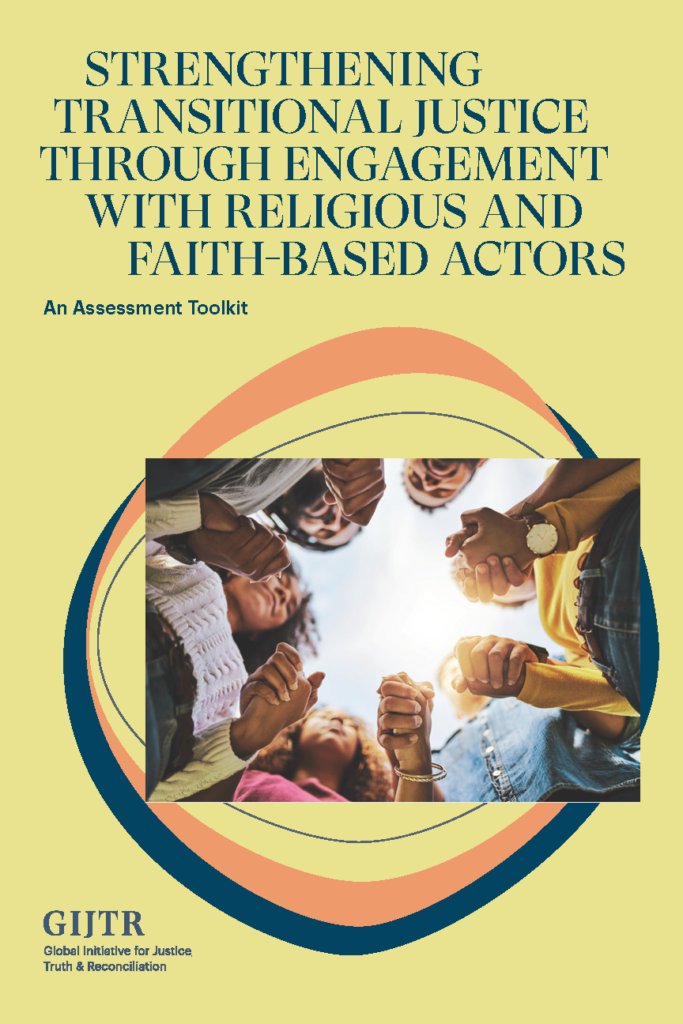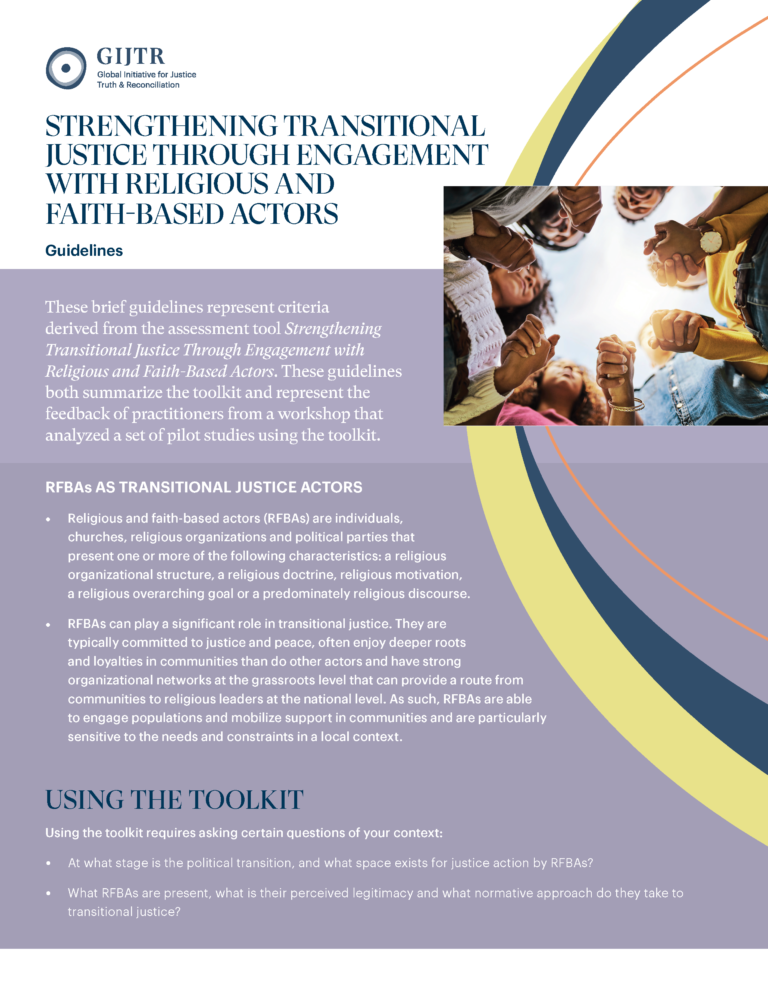RELIGIOUS AND FAITH-BASED ACTORS’ ENGAGEMENT WITH TRANSITIONAL JUSTICE
Religious and faith-based actors have played wide-ranging roles during periods of conflict or authoritarian rule, from peacemakers to tacit support of discriminatory or oppressive policies, to direct or indirect instigators of violence. In some contexts, faith-based actors have been able to build critical grassroots support for peace and reconciliation, but individual religious leaders have also been held accountable for committing atrocities, such as during the Rwandan genocide.
Involving faith-based organizations in transitional justice processes, therefore, requires a proper analysis of their role as well as the contribution they bring to the process. Although the practice of transitional justice and processes aimed at negotiating peace and transition have involved faith-based actors as key stakeholders either leading or advocating for change and democratic order, the role of faith-based actors, and the extent to which they advance truth, justice, and reconciliation goals and influence the success and legitimation of post-conflict reconstruction processes has not been subjected to much inquiry.

Context
The work of the Global Initiative for Justice, Truth and Reconciliation (GIJTR, or the Consortium) has shown that faith-based organizations are increasingly taking an active role in transitional justice processes and in mobilizing victim groups, affected communities and societies not just towards resolving conflicts, but in pursuing truth and justice in order to address consequences of gross human rights violations and achieve sustainable peace. Given the authority and trust accorded to religious leaders by many, including victim groups, perpetrators and affected communities, religious leaders have the potential both for broad outreach as well as access to people at the individual and community levels where inequities and insecurities felt most acutely. From South Africa, Sierra Leone, Zimbabwe and Mali in Africa, to Timor-Leste, Indonesia, Latin America and Ireland, religious leaders – whether local, national and international – have been key players in efforts to break with violent and oppressive pasts.
Project Details
This project seeks to examine how engagement with faith-based actors can strengthen transitional justice processes, in light of the varied roles that religious and faith-based actors (RFBAs) have played during periods of conflict and/or authoritarian rule.
GIJTR and local partners conducted research to produce case studies on key contexts in which religious and faith-based actors participated in formal or non-formal ways in transitional justice processes and the impact of their participation, or lack thereof, on these processes. The Consortium then used the findings of this examination to develop a first-of-its-kind assessment tool for relevant transitional justice stakeholders to determine how the engagement of religious and faith-based actors adds legitimacy or undermines transitional justice processes.
Objectives
Expand resources for policymakers, practitioners and communities determining how participation of religious and faith-based actors in formal or non-formal roles could undermine or add legitimacy to transitional justice processes by examining faith-based actors’ history of initiating, facilitating and influencing transitional justice processes in various contexts
Develop case studies through desk research and interviews on how participation of religious and faith-based actors in formal or non-formal roles – or lack thereof – advanced or impeded transitional justice goals, processes, programs and initiatives in 4 or 5 specific contexts.
Generate criteria for transitional justice practitioners to adopt when considering their level of engagement with religious and faith-based actors in transitional justice processes, highlighting the best practices, successes and contributions of faith-based actors in transitional justice processes
Design an assessment tool that transitional justice stakeholders can adopt to determine how the participation of religious and faith-based actors in formal or non-formal roles could undermine or add legitimacy to transitional justice processes.
Disseminate learnings and raise awareness among stakeholders on how faith-based actors can best be engaged in transitional justice processes; the impacts of their involvement on truth, justice and reconciliation goals; and tools that are available to assess why and how practitioners should engage faith-based actors in transitional justice processes.
Convene an analysis workshop to bring together transitional justice stakeholders, including those from the pilot location and participating communities, to discuss assessment results and recommendations.

Strengthening Transitional Justice through Engagement with Religious and Faith-based Actors
This toolkit has been informed by a set of case studies covering key contexts in which religious and faith-based actors participated in formal or informal transitional justice processes that sought to understand the impact of their participation, or lack of it, on these processes. Contexts comprised Guatemala, Northern Ireland, South Africa, Sri Lanka, Tibet and Tunisia. Additional input was sought from academic and practice literature from a range of other relevant contexts and multicontext research studies.
Before using the assessment tool Strengthening Transitional Justice Through Engagement with Religious and Faith-Based Actors, we recommend reading these brief guidelines that both summarize the toolkit and represent the feedback of practitioners from a workshop that analyzed a set of pilot studies using the toolkit.

GIJTR piloted this assessment tool in Zimbabwe, where it identified and trained local civil society organization (CSO) partners to contextualize and implement a locally relevant assessment tool. The Consortium hosted a workshop with Zimbabwean CSO partners and participating communities to analyze the collected data of the pilot assessment, share feedback and recommendations on the tool, and generate criteria and guidelines for practitioners seeking how and to what degree they should engage RFBAs in formal or informal roles of a transitional justice process. To put the pilot assessment findings into action, the Consortium provided subgrant funding to local CSO partners that work with RFBAs on transitional justice issues, to implement programming that targets areas of need identified in the assessment as well as to raise awareness and/or enhance the participation of RFBAs in transitional justice initiatives. This process permitted further developments of some elements of the toolkit and additions of themes that had been absent and that emerged from the direct experience of practitioners working with it.
